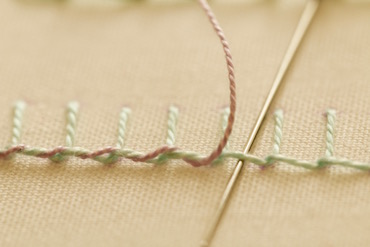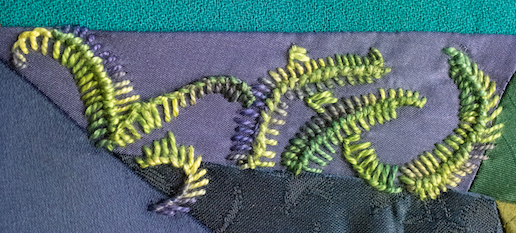- Home
- Basic embroidery stitches
- Blanket Stitch
- Blanket Stitch Variations
3 Fun Decorative Blanket Stitch Variations
Do you love the simple, satisfying rhythm of the blanket stitch but find yourself ready to add a little extra flair to your projects? You're in the right place!
The basic blanket stitch is a wonderful foundation, but its true magic lies in how easily it can be turned into something new and exciting.
First things first: This guide assumes you're already comfortable with the basic stitch. If you need a refresher, pop over to our main Beginner's Guide to Blanket Stitch first.
Ready? Let's explore three fun and easy variations that take this classic stitch to a whole new level.
Variation 1: The Charming Whipped Blanket Stitch
This simple technique adds a beautiful, twisted rope effect to your stitch line. It’s perfect for creating bold outlines and adding a pop of a second colour.

How to do it:
- First, stitch a standard row of blanket stitch.
- Next, take a second thread and "whip" the corded bottom edge by passing your needle under each loop in a consistent direction. For this sample, I used a different colour of the same Perle number 8 thread.
A helpful tip:
To avoid accidentally splitting your foundation stitches, try using a blunt tapestry needle for the whipping part. You’ll only be passing the needle under the previous stitches, not through the fabric itself.
Variation 2: The Leafy Barb Stitch
This clever method, also known as back-to-back blanket stitch, creates a beautiful, symmetrical stitch that looks wonderfully like a fern or a tiny branch. It's perfect for many kinds of botanical designs!

How to do it:
- This technique involves placing two rows of blanket stitch so they are mirrored, or back-to-back.
- Then, using a third thread, you'll whip the looped edges of both rows together down the center, creating the "stem" of the fern.
This stitch looks remarkably realistic, especially when stitched with a hand-dyed thread. It would be lovely in autumnal golds and browns for a fall-themed project!
Time for a Little Experiment!
You can change the look of your barb stitch in one simple way.
Try stitching one version where the two rows sit side-by-side, and another where the second row slightly overlaps the first.
You'll see one creates a flat, leafy effect, while the other gives you a lovely, raised central stem. Have fun seeing which you prefer!
Variation 3: Playful Scallops & Buttonhole Wheels
This variation is all about playing with the height of your stitches to create circles, scallops, and fun, wavy lines, all from the same basic stitch.

To create scalloped edges
Simply vary the length of your blanket stitches as you work along a line.
Experiment with gradually increasing and then decreasing the stitch height to form repeating "hills" and "valleys".
To form a buttonhole wheel
Work your stitches in a circle, always taking the needle down into the same central point to form the spokes of the wheel.
Time to Play!
And just like that, you have three new ways to get creative with a classic stitch. The real fun begins when you start experimenting with different thread types, thicknesses, and colour combinations to see what beautiful effects you can create.
Have fun incorporating these ideas into your hand embroidery projects!
Stay connected between projects
If you’d like occasional updates from my embroidery room, including new patterns, gentle tips, and little things I think you might enjoy, you’re warmly invited to join the Stitchin’ Times newsletter.

